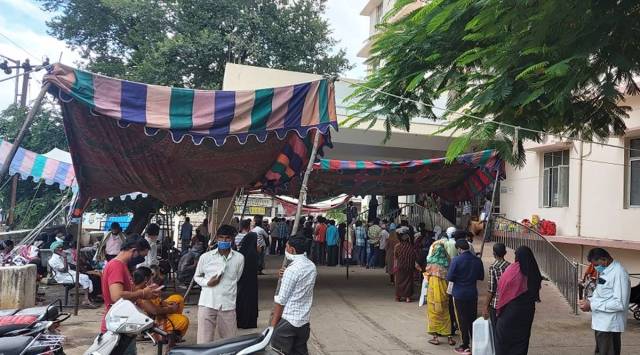- India
- International
‘Treatment can’t wait for pandemic’: Covid-19 Cancer patients return to Hyderabad hospital despite higher risk
While there are no signs yet of the Covid-19 pandemic abating, a large number of patients have started flocking to the hospital since August.
 Every morning, hundreds of patients accompanied by attendants line up outside the outpatient block of the hospital. (Express photo/ Rahul V Pisharody)
Every morning, hundreds of patients accompanied by attendants line up outside the outpatient block of the hospital. (Express photo/ Rahul V Pisharody)“I have Cancer. The virus is the least of my concerns in life.” Y Shankar, a head-load worker hailing from Mancherial district of northern Telangana, is very clear about his priorities.
With the unlock regimes kicking in, he is among the scores of patients flocking to Hyderabad’s Mehdi Nawaz Jung (MNJ) Institute of Oncology and Regional Cancer Center (RCC) for the restart of treatment. The 52-year-old, diagnosed with cancer when the COVID-19 pandemic led to a nation-wide lockdown, has now rented a small room in Hyderabad along with his nephew. As the restrictions have eased up, he decided to waste no more time proceeding with treatment and will be visiting the hospital for another three weeks.
Every morning, hundreds of patients accompanied by attendants line up outside the outpatient block of the hospital. The state-run facility at Red Hills is the only regional centre for the states of Andhra Pradesh and Telangana, catering primarily to the underprivileged. While there are no signs yet of the Covid-19 pandemic abating, a large number of patients like Shankar have started flocking to the hospital since August.
 Mehdi Nawaz Jung (MNJ) Institute of Oncology and Regional Cancer Center (RCC) (Express photo/ Rahul V Pisharody)
Mehdi Nawaz Jung (MNJ) Institute of Oncology and Regional Cancer Center (RCC) (Express photo/ Rahul V Pisharody)
“Cancer treatment cannot wait for COVID to go,” explains Dr N Jayalatha, director of the hospital. “We see over 600 outpatients every day. At any given time, there are about 600 in-patients, too. We are getting about 10 positive cases of COVID19 everyday,” she adds for context. “These are very challenging times for all healthcare providers and we are taking extra care to ensure safety of patients and staff.”
According to the hospital records, RT-PCR tests have been conducted so far on over 2000 patients who displayed symptoms of COVID-19 and 235 results came out positive, including 32 healthcare providers. Those who test positive are being shifted to Gandhi Hospital. While most of them have recovered and returned for treatment, a source said at least 15 mortalities in this set till last month.

Research worldwide has revealed that cancer patients hospitalised with a high viral load of SARS-CoV-2 are at greater risk of dying. A recent study conducted by the Rajiv Gandhi Cancer Institute and Research Center, Delhi, claimed the case fatality rate (CFR) in cancer patients is 7.6 times more than the national average. Of the 1,088 patients tested for COVID-19 at the hospital for the study, 186 were confirmed positive between June 8 and August 20. The CFR was 14.5 percent as against a national average of 1.96 percent, after 27 patients succumbed to the disease.
The gradual return to normalcy in terms of patient caseload, according to Dr C Sairam, the president of the Hyderabad chapter of the Indian Medical Association(IMA) and a senior oncologist at the hospital, puts both healthcare providers as well as patients are at high risk of exposure to the coronavirus. The immunosuppressed condition of Cancer patients makes them extremely vulnerable.
 According to the hospital records, RT-PCR tests have been conducted so far on over 2000 patients who displayed symptoms of COVID-19 and 235 results came out positive (Express photo/ Rahul V Pisharody)
According to the hospital records, RT-PCR tests have been conducted so far on over 2000 patients who displayed symptoms of COVID-19 and 235 results came out positive (Express photo/ Rahul V Pisharody)
“Cancer treatment goes on for around two years. In case of radiation therapy, a patient has to visit the hospital five times a week for two months and in case of chemotherapy, he/she has to visit the hospital once in three weeks. Their immunity levels will be very low and visits to hospitals naturally expose them to the virus,” he says.
At the regional cancer centre, though surgeries are performed on cancer patients as before, there is a drop of 10 percent at present, he says. “Post-operative cases face the maximum risk due to the virus. Wherever we can delay a surgery with hormonal therapy, radiation therapy or chemotherapy, surgeries are postponed.”
The hospital now performs around four surgeries a day, down from seven in the same period last year. Patients scheduled to undergo surgery are put through a screening for viral infection and given a green signal only if they test negative in RT-PCR test as well as in a CT-scan and X-ray of the lungs. “There is only a marginal decrease in surgeries. A case of cancer is an emergency and we did not stop surgeries even during the lockdown period. Of course, we too are worried for our safety,” a senior anesthetist fills in.
The number of patients subjected to radiation therapy has also witnessed a marginal decline. A radiation therapy technician at the hospital says around 250 patients undergo radiation therapy everyday. “We are the only cancer hospital where radiation therapy is conducted in three shifts from 5 am to 11 pm. Before COVID-19, it used to be around 350 to 400 patients a day.”
 Research worldwide has revealed that cancer patients hospitalised with a high viral load of SARS-CoV-2 are at greater risk of dying. (Express photo/ Rahul V Pisharody)
Research worldwide has revealed that cancer patients hospitalised with a high viral load of SARS-CoV-2 are at greater risk of dying. (Express photo/ Rahul V Pisharody)
Dr P Raghuram, national President of the Association of Surgeons of India and a senior oncologist, is of the opinion that COVID-19 is here to stay for at least another 18 months and we should be ready to live with it. “One of the commonest presentations in breast cancer, for example, is a painless lump. As it is 70 per cent of breast cancer cases present in the advanced stages. One should not ignore any symptoms. Early detection is the key,” he says.
According to him, patients need not worry when visiting hospitals. “Six months down the pandemic, we have well established protocols and international guidelines in place. These are being followed. Treatment options and survival chances are limited if an early stage cancer progresses to an advanced stage due to delay in treatment,” explains Dr Raghuram, also director of KIMS-Ushalakshmi Center for Breast Diseases.
As of September 22, Telangana has recorded a cumulative caseload of 1,77,070 cases of COVID-19. As per government data, 29,783 patients are active and under treatment. Of them, 6,346 patients are admitted to various hospitals. The recovery rate stands at 82.52 per cent and the CFR is at 0.59 per cent.
Apr 24: Latest News
- 01
- 02
- 03
- 04
- 05







































